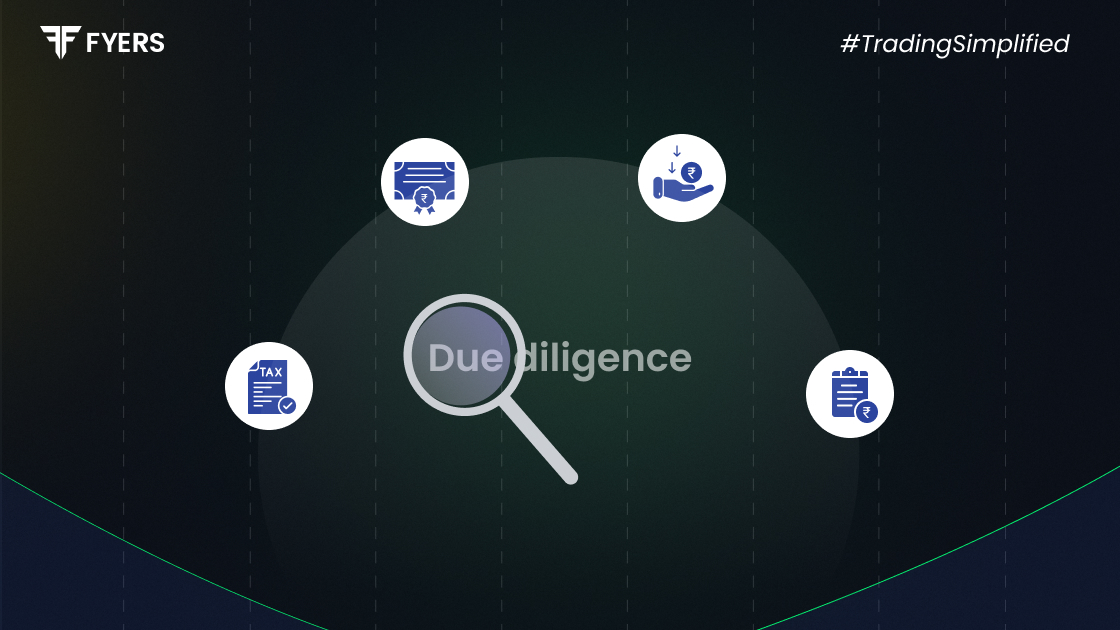

 31 Aug, 2025
31 Aug, 2025
 4 mins read
4 mins read

Before signing a major business deal or investment, it’s essential to check all the facts. That’s where due diligence comes in. It helps you understand what you're getting into by reviewing financials, legal risks, and operational details. In India, this step is crucial for mergers, acquisitions, investments, and even real estate purchases.
Let’s simplify what due diligence means, the different types, why it’s important, how the process works in India, and share some easy-to-understand examples.
Due diligence is the process of carefully checking important details before agreeing to a deal. It helps people and companies avoid risks, spot problems early, and make better decisions.
For example, if you’re planning to buy a company, this process helps you find out if its finances, legal matters, and operations are in good shape. It’s like checking a used car before buying it - you want to know if it runs well and has no hidden issues.
There are several types of due diligence, each focusing on different aspects of a business:
Financial Check
Looks at income statements, balance sheets, and tax records.
Helps find any unpaid taxes or hidden debts.
Legal Review
Involves checking contracts, licences, and any ongoing legal cases.
Ensures the company is following the law.
Operational Review
Examines day-to-day business processes, staffing, and suppliers.
Finds out if the business runs efficiently.
Market Position Review
Reviews the company’s standing in the market, customer feedback, and competitors.
Helps decide if the business can grow or survive competition.
Other types include IT, tax, and environmental checks, especially in specific industries.
Doing a proper review before a business deal is important for many reasons:
Avoiding Surprises: Helps uncover hidden debts, legal issues, or outdated licences.
Better Pricing: Shows the real value of the company or asset.
Legal Safety: Makes sure all paperwork is complete and rules are followed.
Investor Trust: Gives investors confidence that they are making a smart choice.
Skipping this process can lead to expensive problems or even legal trouble.
In India, this process is a must for buying companies, investing in startups, or buying property. Here is how it usually works:
Set the Scope
Decide what areas to check and what documents are needed.
Collect Information
The company shares financial reports, legal documents, and other records.
Examine the Data
Professionals such as accountants and lawyers go through the information.
Meetings and Visits
Talk to management and visit offices or factories to learn more.
Final Report
A detailed report is prepared, listing risks and suggestions.
Take Action
Based on the report, you can negotiate the deal again, ask for changes, or walk away.
Big firms in India like EY, Deloitte and KPMG often handle this work for larger deals.
An investor plans to invest in a food delivery startup. After checking the financials and legal records, they find that the startup owes back taxes. They reduce their investment offer to cover the risk.
A company wants to buy office space in Pune. A legal check reveals the building does not have fire safety clearance. The company cancels the deal.
A large IT firm is buying a smaller one. An operational review shows the smaller firm is losing clients. The buyer uses this to lower the purchase price.
These examples show how useful this process is in saving money and avoiding bad decisions.
Due diligence is a smart way to protect your money, time, and reputation. Whether you are investing in a startup, buying a business, or finalising a property deal in India, taking time to check all the details can prevent costly mistakes.
It helps you make informed choices by pointing out risks and providing a clear picture of what you're getting into. In short, it gives you peace of mind before saying yes to a deal.
It means checking facts and documents before agreeing to a deal. It helps you find problems and make better decisions.
The main types are financial, legal, operational, and market-related reviews. Each one checks a different part of the business.
Experts like accountants, lawyers, or consulting firms carry out the review. For big deals, companies hire firms such as EY, Deloitte, or KPMG.
It’s not always legally required, but it’s highly recommended. For sectors like real estate, banking, and listed companies, it’s often necessary.
It depends on the deal size. Simple cases may take a week or two. Bigger or more complex deals in India can take up to 6 weeks or longer.
Calculate your Net P&L after deducting all the charges like Tax, Brokerage, etc.
Find your required margin.
Calculate the average price you paid for a stock and determine your total cost.
Estimate your investment growth. Calculate potential returns on one-time investments.
Forecast your investment returns. Understand potential growth with regular contributions.